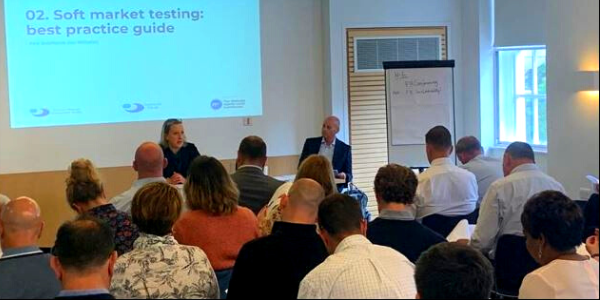Contractor Corner
Our NHMF Contractor Forum membership represents the housing sector’s very best in innovation, best practice and collaboration. Embodying a broad cross section of organisations with differing interests and specialisms, from the large to the small, we’re speaking to a cross section of our members about the benefits they get from the Forum.

Soft Market Testing: a cultural shift
In this August issue of Contractor Corner, we speak to Kim Newman, Managing Director of PML Group, the leading consultants in business improvement and collaboration within housing. Kim has been part of an NHMF Contractor Forum Working Group, devised to develop a best practice guide to Soft Market Testing within the social housing sector. The guide derives from the practical insights, experience and knowledge of contractors, consultants, clients and procurement professionals., As such, it provides a 360-degree view of challenges and issues, with some general principles on how to address these.
Kim comments: “The Working Group came about because of work previously carried out by The Contractor Forum which started to look at the drivers, effective use of and views towards Soft Market Testing. The Procurement Green Paper for the 2022 Bill then provided the catalyst for further collaborative focus on the area, so we could understand the extent to which Soft Market Testing is being used; how effectively it is being used; and to set out a best practice approach for success.
Fear of change
Any changes to the procurement process can be daunting and introducing Soft Market Testing is no different. Public sector organisations are quite rightly recognised for their cautious approach to decision making to ensure compliance with procurement regulations. Anxiety was high when open book and Partnering were in their infancy, but now more collaborative and flexible approaches such as Competitive Dialogue are recognised procurement processes. However, some of these processes can be overly complex. We are also in a period of unprecedented demand. That’s why as a sector, we need to approach Soft Market Testing as a way for clients to have earlier engagement with contractors to save time, money, and resources, and embrace it as a potentially more effective way to help clients design and procure the right solution and the right partner.
“It’s a concept that may seem easy on the surface, but once you really dive into the fundamentals, there are many drivers that will influence the direction of travel. Almost all of these will require changing skill sets and evolving working behaviours. The requisite administrative and process, compliance driven skills required for example, during Public Contract Regulations procurement, will need to adapt to embrace a more creative and flexible approach to working with third parties and identify procurement solutions. Of course, some of the fundamental principles around intelligent procurement remain the same, one of the main ones being proper planning and allowing enough time for the entire process from start to end, likewise transparency is a given.
Be an intelligent client
“The introduction of Soft Market Testing is also a sign that the market has changed. With finite resources and widespread supply chain disruption, the balance of power and the choice of who to work with on what contracts, is swinging towards contractors. They are in a strong position to cherry pick clients, putting more of an impetus on those procuring, to act attractively and intelligently. Not allowing contractors enough time to produce a thorough and well considered bid, won’t result in high quality responses and projects.Bidding is an expensive and time consuming, speculative process and allowing a reasonable response time will put certain clients ahead of other procurers in the eyes of the contractor. Soft Market Testing is just as useful for clients to show how attractive they are, as it is for contractors to promote themselves. It’s great way prior to ITT for collaboration, identifying and answering questions before committing to a particular approach and tender specification. It can also be a way to broaden out to reach other potential partners who are outside of the sector.. Clients need to be prepared for feedback and unexpected findings that ideally result in adjustments to the tender process, or there isn’t much point in going through the exercise. It also tells potential bidders that you will listen and make changes accordingly. In other words, a client with whom they will want to work.
Key learnings
When we explored the preferred mechanisms used to conduct soft market testing, this revealed an interesting but predictable contrast between the contractors and clients surveyed.
- 43% of contractors surveyed preferred face to face events, this being generally reflective of a preference to build relationships and engage in a two-way conversation in order to gain greater understanding of the what the client wants and is seeking from the contractors.
- 36% preferred webinars which in the absence of face-to-face contact provides the next closest form of engagement, and 21% preferred questionnaires which is perceived to be the most remote form of engagement
- 50% of clients surveyed preferred questionnaires which illustrates a preference for a more arm’s length approach to engagement, perhaps indicative of concerns in relation to transparency of the process. This was followed by 28% favouring multiple measures such as a combination of questionnaire and event, 17% preferred face to face events and 5% preferred webinars.
- Allow time between the Soft Market Testing and procurement process in order to provide time to consider the feedback.
- Keep the questionnaires short and simple, easy and clear to complete and simple to analyse the data when received.
- Research – understand the market before approaching it.
- Engage third party experts to support or run the process.
- Contractors are aware of the market; clients need to be aware of it as well.
- Tipping point – contractors are much more demanding in terms of expectations of clients and what they will/won’t bid for.
In conclusion, Soft Market Testing is an approach that I believe will help contribute to a fairer, broader reaching, more transparent, creative and effective approach to procurement.
We are still looking to gain more insight and views from clients and contributors on the issue. If you’d like to play a role in shaping the future of procurement, please contact Kim Newman or to get a copy of the paper, NHMF website? Or Kim Newman
If you’d like to join the Contractor Forum or find out more about how you can shape the future of our sector, contact imogen.bowen@m3h.co.uk and visit the web page
Article produced by Brouha



